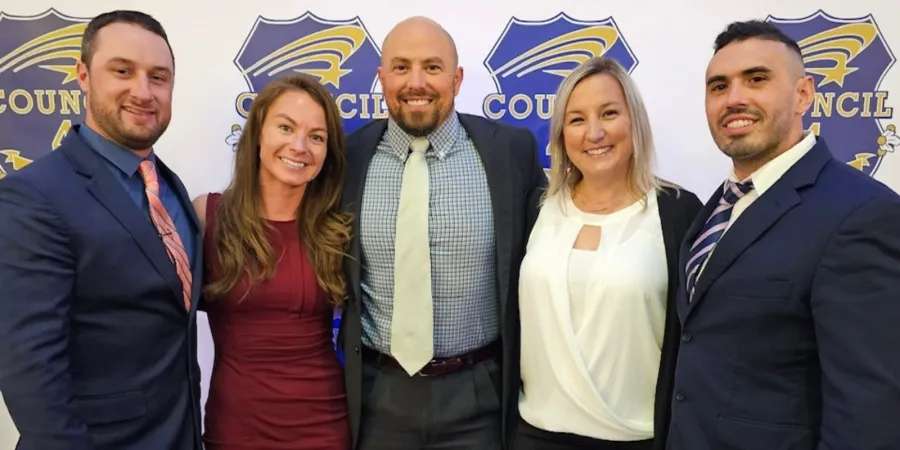A hall of fame detective changes perspectives about policing

Forget the stereotype of the sly, hard-bitten TV detective. Yes, Middletown, Connecticut, Detective Karli Travis is tough and smart, but her job is as much about lifting people up as it about taking down bad guys.
Travis came to the Middletown Police Department eight years ago with a degree in mental health counseling and psychology.
“I thought mental health was important (for) police officers,” said Travis, a member of Local 1361 (Council 4). “And police departments around the country want more knowledge and understanding of mental health among police officers to better serve their communities.”
Travis spent five years as a patrol officer and then moved to the department’s special investigations unit, focusing on cases involving sexual assault, crimes against children, and missing people.
[caption caption="Det. Karli Travis (center) being inducted into the National Law Enforcement Officer Hall of Fame. Photo courtesy of Karli Travis." align="right"][/caption]
That, in turn, led her to the Internet Crimes Against Children (ICAC) Task Force, a nationwide law enforcement program aimed at investigating the dark nexus of the internet and the exploitation of children.
“I love my position as a detective, working with child victims of sexual assault, because those are often the hardest cases to manage and get justice for the victims,” said Travis. “Those are the victims who can’t speak up. I’ll do everything I can so they can sleep better at night. That’s why I like to wake up and do my job.”
But that’s only one of the hats Travis wears.
She also helps run Middletown’s “cadet” program, mentoring kids from 13 to 21 years of age who are interested in becoming first responders, giving them real-world experience.
“It’s very rewarding,” Travis said.
On top of that, Travis spearheads Middletown’s car seat technician program. People from Middletown and nearby communities can come by the police station where Travis or a fellow officer will install their car seat for free.
“We’ll also provide car seats free of charge for families who are undergoing financial hardships, so they have one less thing to worry about in an already stressful time,” she said.
In short, Travis’ career mirrors that of many other AFSCME public safety professionals: community-first, multifaceted and performed with quiet professionalism.
However, last August, Travis was launched into the public eye when she took a call on an early, sunny Saturday morning. She was helping out on a midnight-to-8 a.m. patrol shift, a departure from her plainclothes detective work.
Responding to a call about an individual breaking glass, Travis located a man coming out of a home holding a claw hammer. Her body camera footage showed her calmly asking him to put the hammer down; he refused. She asked again, but before she knew it, the man charged at her. He struck Travis, knocking her to the ground and continued to assault her with the hammer as she fired at him several times in self-defense.
Wounded, the man retreated into the home, where he was eventually captured by other officers. Travis was treated and released from a hospital. The man was also treated at a hospital and was charged with assault on an officer, among other charges.
For her bravery, Travis was inducted into the National Law Enforcement Officer Hall of Fame. After a rigorous application review, she was honored with the Courage in Service Award.
“It was amazing,” Travis said. “It was a huge honor, and I met a lot of people there who also deserve that award as well.”
Travis credits her union with securing the care and time off she needed after the traumatic attack. And she hopes her story can be a lesson for the public about the work police professionals like her do.
“One of the most important things to understand is how quickly things can change and escalate; how we’re unable to see the future.”
Travis said there’s a good way to break down the stereotypes — and the barriers — surrounding police.
“I would encourage people to go out and meet the law enforcement within their own communities and go to different events,” Travis said. “Have conversations, ask questions — the internet and TV doesn’t always show what the actual job is like, and the only way to get a real answer is to talk to a police officer and detective.”
Public safety professionals like Karli Travis are increasingly turning to AFSCME to build power at work, and to advocate for safety on the job, better wages, good health care and a secure retirement. AFSCME members in corrections, law enforcement and emergency response defend our freedoms and those of the communities we serve.
